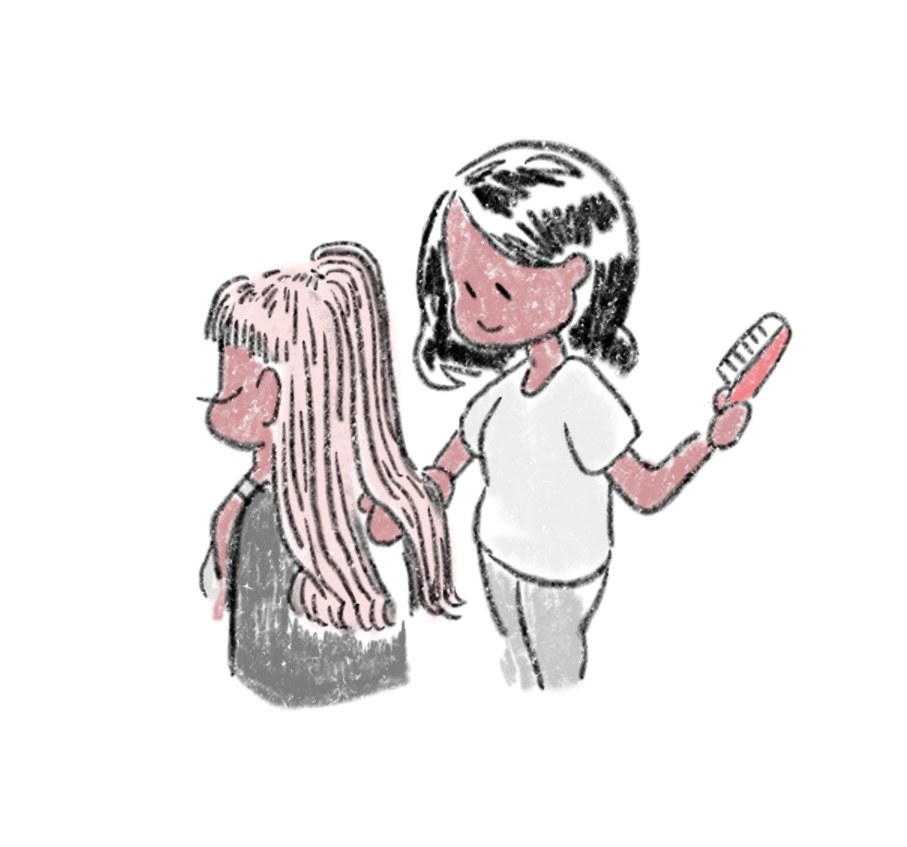
Contributing Illustrator/Ha-Tien Nguyen
My mother is deeply kind, but not very nice. Once, I cried to her because I felt ugly, and she told me that I wasn’t a supermodel anyway — that I must make peace with being average. On countless other occasions, I’ve called her from college wanting words of sympathy, an “Oh, honey, that’s horrible.” Usually, I receive a “Well, what are you going to do about it?” I’ve always wanted to ask her why she couldn’t act like a nice white mom, the kind who coddles her children into believing that everything they do is incredible — but I’m sure my mother would only say, “Why would I lie to you if I love you?”
I’m not the first person to write these words. Last month, I wept while watching Evelyn in “Everything Everywhere All at Once” tell her daughter, Joy, that she was getting fat, because I knew that what she really meant to say was that she was sorry. On screen, I could see an apology getting caught in her throat only to emerge as an insult; in my theater seat, I envisioned unspoken apologies flicking across my offscreen mother’s face in the same way. And last year, I laughed reading “Crying in H Mart,” in which Michelle Zauner describes her mother as the antithesis to a nice white mom: “She was not what I’d refer to as a ‘Mommy-Mom’ … someone who takes an interest in everything her child has to say when there is no way she gives a shit.”
There is a moment before Evelyn and Joy’s tearful reconciliation in which Joy tells her mother that being together only hurts them both. I nodded my head in agreement then, remembering bitter tears and the resentment I held toward my mother for instilling hurt in me without even realizing it. And yet I want to believe that the existence of these other mothers that came before mine is proof my mother was always right, that her hurt held purpose. Like Evelyn or Mrs. Zauner, my mother says to me the things others won’t, because she wants to protect me. So often she tells me that I need to be tough, and in those moments I imagine her harsh words becoming darts, hurled at me so my skin grows thick enough for the sharp to feel dull.
I have to remind myself of this when she chastises me for leaving dishes in the sink or throwing clothes on the floor; these are both behaviors, she cautions, that will lead to the dissolution of my future relationships. When she tells me, “Your future husband will resent you when you do this!” I want to scream back: “Why is everything I do a disappointment?” But, I realize now, that it’s never been about the hypothetical husband — my mother is a woman who cares about sparing me from heartbreak, shielding me from pains that she hopes I’ll never know. When she criticizes me, it’s hard to not feel like glass in her hands being dropped over and over again. I’m trying to think of her now, though, as a sculptor of sorts; she’s collecting what’s shattered, holding it close and trying to mold it into the body of a daughter who can be even stronger than her.
My mother knows that I’m single this Valentine’s Day. She doesn’t know, however, that I kept the news of this recent breakup hidden from her for a while. In the wake of every movie breakup there is always a “Mommy-Mom” stroking her daughter’s hair and telling her how amazing she is – I couldn’t bring myself to pick up the phone and tell her, because I couldn’t bear for her to know that I had, in fact, left dishes in the sink and thrown clothes on the floor. I didn’t want to hear that I’d done it all wrong.
But there’s a future I can imagine where I tell her everything. I’ll tell her how sorry I feel that I had to consume so many books and movies about mothers that aren’t mine in order to understand her. I’ll tell her that I can see the fine lines on her skin, those deep etchings left by all her frustrations over not knowing how to talk to me. I’d like to press my fingers into her forehead and smooth it slowly, the way she always did while chastising me for furrowing my own brows: Bùyào zhòuméi! Worrying, she warned, would give me wrinkles — now, I want to tell her the same, that I don’t want her to give herself scars from hoping she’s saying the right things to me.
Most of all, I’ll want to sit in silence and let her tell me that I’m not a supermodel, that I did it wrong and that I need to pick up the clothes. For so long, we’ve circled each other in frustration, each person not knowing what to tell the other. But in this future — closer than it seems, just barely out of reach – we don’t hurt each other anymore. All that’s left for me to do is listen. Because she was never mean, really; she was only trying to love me.
Julianna Chen (23C) is from McMurray, Pennsylvania.
Julianna Chen (23C) is from McMurray, Pennsylvania.




